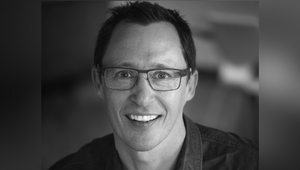
Meet Your Makers: Ron Cicero on Why Perseverance Will Always Win Out

Throughout his 20-year career as a commercial producer, Ron has partnered with industry leading creatives including Judd Apatow, Jesse Moss, and Academy Award winners, Ben Grossmann and Alex Henning, among others. His efforts have been recognized by the AICP, the Cannes International Festival of Creativity, The Clio Awards, The One Show and The D&AD Awards. The branded documentary short 'Makers & Gamers', directed by Oscar nominee Jesse Moss for SonyPlaystation, garnered over two million views in five days; Ron's work for the Academy Awards™ was seen by an audience of almost 40 million.
In addition to a range of filmed content, Ron produced an interactive fragrance museum for clients Sephora, and perfume powerhouse Ferminich. The first branded experiences of its kind, the Sensorium received a Gold Pencil at the One Show, an In-Book Slice at the D&AD awards, recognition for Excellence in Spatial Design at the AICP Next Show, and a Notable Mention in Interaction for the Core 77 International Design Awards.
Outside of advertising, Ron has always had a passion for documentary filmmaking. He utilised his production skills to produce his first feature, 'Happy Happy Joy Joy: The Ren & Stimpy Story', which premiered at Sundance in 2020. The film gained a theatrical release via Gravitas Ventures, with positive reviews from fans and critics alike. As a commercial EP, Ron continues to represent a diverse slate of directors at the legacy production house, CoMPANY Films.
LBB> What first attracted you to production - and has it been an industry you’ve always worked on or did you come to it from another area?
Ron> I came to commercial production as an independent filmmaker, jumping right in as a line producer. I never worked my way up through the ranks of production. This caused a bit of eyebrow raising with commercial production teams as I was clueless about the paperwork—PO? What’s a PO?— but I had a deep understanding of what it physically took to make a spot.
So while I still had to learn the intricacies of vendor payments, I had a leg up as I knew what we were actually going to be paying for. And conversely, not be paying for. I could also suggest solutions when hurdles came up.
It helped I had an understanding EP (Frank Scherma) and an incredibly loyal director (Erik Moe.) They quite literally changed my life.
LBB> How did you learn to be a producer?
Ron> To learn producing is really to learn salesmanship. And I don’t mean this in a used-car-shark-skin-suit-kinda-way. It’s about finding out what the agency, the director and every department wants, and frame what you are trying to accomplish in their terms. That’s producing. To steal a line, “The whole bag of movies can be learned in a day and a half.” It’s the ability to satisfy often very different needs, in service to the work and the production company’s bottom line, that can only be learned by doing.
In many ways, another word for salesmanship is leadership. Some people don’t have that skillset or are not super interested in learning it. If you are going to take the leap from line producer to EP, which I did, it’s a skillset you will rely on.
LBB> Looking back to the beginning of your career, can you tell us about a production you were involved in where you really had to dig deep and that really helped you to grow as a producer?
Ron> There was an experience early in my career that was more than just learning about the job itself. I was line producing what was supposed to be a significant sized campaign: a budget between $4 and $6 million. The creative director / agency owner was very well known and had some serious bonafides. Because of the nature of the project, I found myself interacting with him, along with the EP and the HOP, as the budgets and schedule were being finalised.
Everything seemed to be going fine until I was called into the EP’s office. I was off the project. I was dumbfounded, especially because the reason given was the ECD said I was ignoring him. I was crushed! It made no sense. None. But that was it. The decision had been made.
When I asked my team how this could possibly happen, someone spoke up and said, “Yeah, you kind of do that [ignore people.]” Now I was really beside myself. After a few examples, it started to dawn on me.
As it turned out, I wasn’t ignoring anyone, it was I couldn’t hear them. Unbeknownst to me, I was going deaf, in both ears, at 32 years old. It was devastating. Fortunately, this incident, while painful, led to corrective surgery and my hearing was largely restored.
It taught me an important lesson: don’t jump to conclusions as to why someone is responding—or not responding— in a certain way. The cause may not be what you think it is. I mean, it's certainly much easier to believe someone who looks fine is ignoring you; not they can’t hear certain tones and voices! And that of course extends to all kinds of wrong impressions.
As luck would have it, the entire project was scrapped soon after; the ECD paid us a generous kill fee; and now I can hear-ish.
LBB> A good producer should be able to produce for any medium, from film to events to digital experience. Do you agree or disagree with this statement? Why/why not?
Ron> In theory, yes, a good producer should be able to produce for every medium. HOWEVER, in practice, how each of these mediums are approached, and which partners are the leaders in each field, can take time and experience to suss out. Different personality types also tend to gravitate to each medium, which can require some re-calibrating in your approach.
LBB> How has production changed since you started your career?
Ron> One aspect I noticed that has changed a lot in general is how technology has enabled more diverse crews. We often hear about changes in digital cinematography, but that has been far outweighed by Youtube making film knowledge so widespread. When I started, you were dependent on working your way up the ranks, learning from the head of whatever department you were in. Now, just about anyone can learn at least the basics of film craft. Years of apprenticeships and/or expensive film schools are not a requirement. We still have a ways to go, but technology is definitely enabling a democratisation of film knowledge.
LBB> And what has stayed the same?
Ron> Its cliché but true: perseverance will always win out. Regardless of where you are headed, brushing off rejection and keeping your eye on the long game will always supplant raw talent.
LBB> Which production project from across your career are you most proud of and why?
Ron> While I have several spots I’ve either lined produced or EP’d that I’m really proud of—including work with Judd Apatow for the Oscars—the feature doc 'Happy Happy Joy Joy' is probably top of the list. It would have been so easy to have given up when the first version of the film was torpedoed by the main character’s outing in the #MeToo movement.
Instead, it became an exercise in pure grit: another year of shooting and a significant recut. The film premiered at Sundance, was picked up by Gravitas and released theatrically (albeit during Covid) so it all worked out. But boy, none of that was assured when we were in the middle of it.
LBB> And in terms of recent work, which projects have you found to be particularly exciting or have presented particularly interesting production challenges?
Ron> I think it’s fair to say all of us are grappling with budgets vs expectations. The saving grace is, this isn’t particularly new. I remember a conversation with Bill Faye who has produced more than a few $100 million movies— even before those budgets were the norm. I said, “Wow, working with that kind of budget must be amazing.” Bill said, “That budget comes with the expectation you’ll make a $200 million movie.”
I guess we can take solace in knowing no matter what the budget is, the expectations will always exceed it. If it didn’t, what fun would producing be?! (Insert tear-eyed emoji.)
LBB> Producers always have the best stories. What’s the hairiest / most insane situation you’ve found yourself in and how did you work your way out of it?
Ron> You haven’t lived until you self-finance a film for two years only to find you may be left with a $250,000 hard drive and not much else. Fortunately, as relayed above, it all worked out.
LBB> As a producer your brain must have a neverending "to do" list. How do you switch off? What do you do to relax?
Ron> Brazilian Jiu-jitsu has been a godsend when it comes to stress relief. Not only is it a great physical workout, you tend to leave work behind when someone is trying to choke you out.
LBB> Producers are problem solvers. What personally fuels your curiosity and drive?
Ron> I can only speak for myself, but I would bet the combination of an adrenaline addiction and ADD, sprinkled in with a little childhood trauma, fuel a lot of producers’ curiosity and drive.
LBB> What advice would you give to people who are interested in becoming a producer?
Ron> Well…. this is a bit of a complicated question. The asks are changing so quickly in this industry, with seemingly each new project having such a different set of needs. The traditional advice has been, “Just find a way on set and pay attention to every department, and what they do and how long it takes them to do it.”
But now there are technologies and mediums that have popped up in the last two years — and this trend will only accelerate with AI—that you really need to be keeping up with the latest tech before it hits your set. That’s the “bag of filmmaking” part.
Provide we are not all replaced by the cloud, what will never change is the people aspect. I would strongly encourage anyone who is just entering the business to get any kind of sales and/or leadership training. We are complicated creatures and what is often “logical” may not always be the right approach. Anyone reading this who has been married for longer than five years knows what I’m talking about.
LBB> From your experience what are the ingredients for a successful production?
Ron> Trust and respect. You’ve hired a director, DP, best boy, make-up artists, etc. based on their reputation and prior work. It’s now up to everyone who is a collaborator on that set to enable those co-conspirators to do what they do. It may take some refocusing at times, reminding individuals what we are trying to accomplish, but I’ve found everyone involved wants to make the best possible film.
What causes breakdowns in the process is when expectations or limitations are not communicated upfront. And there is the feeling efforts are being stifled. Or worse, you don’t trust whomever to do the job you hired them for. Micromanaging is the death of good work.













